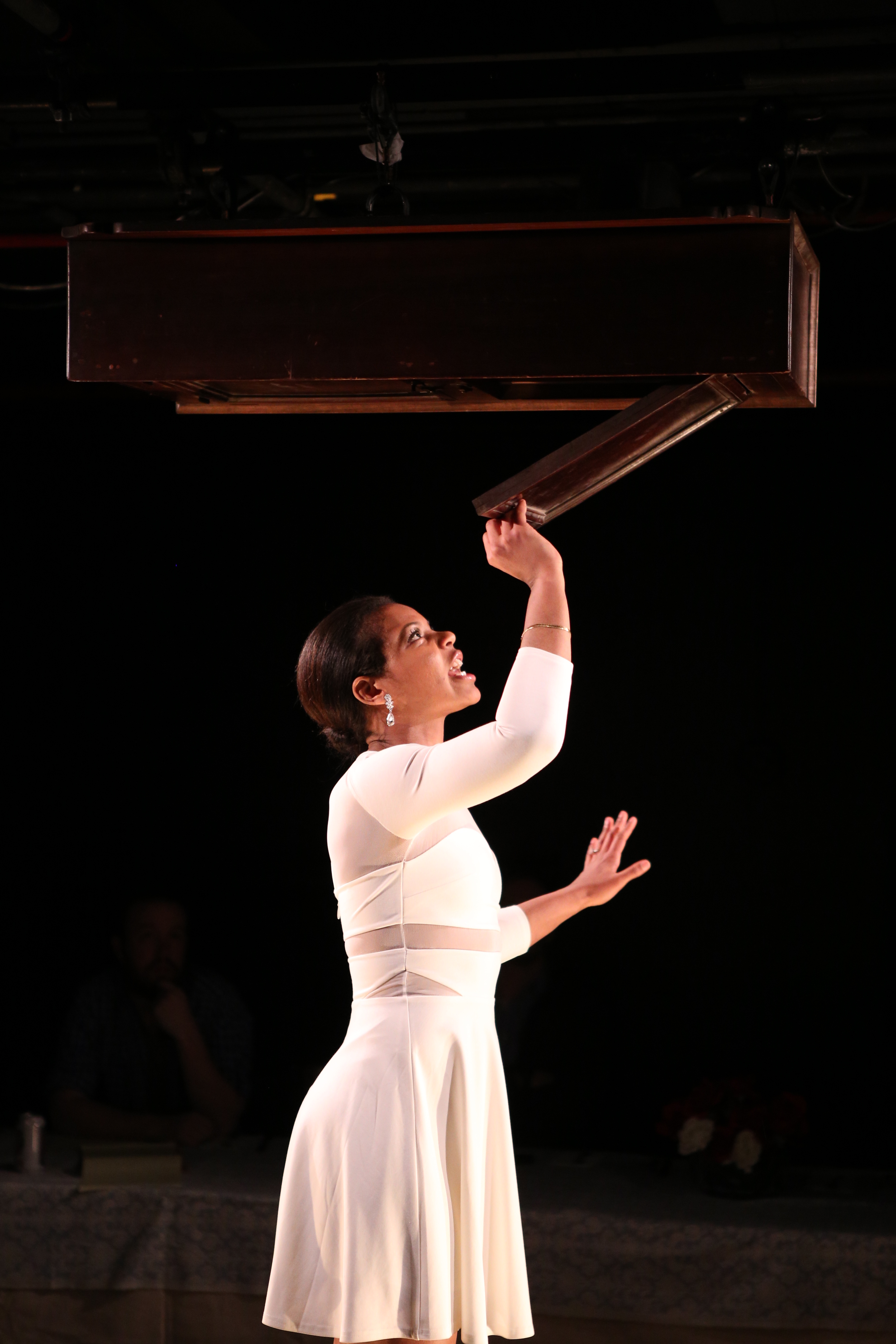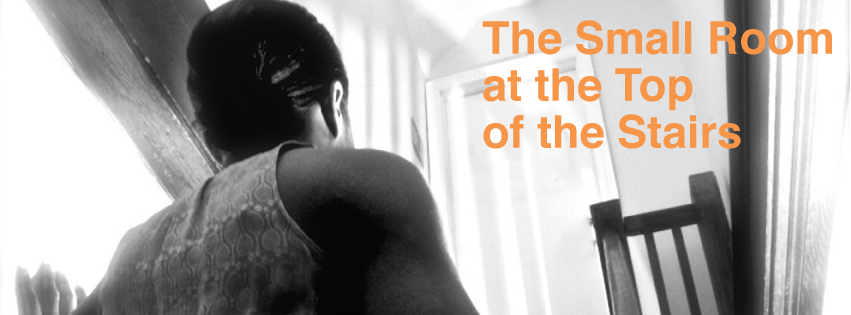Carole Fréchette’s The Small Room at the Top of the Stairs, directed by Cole Lewis and currently playing at the Yale Cabaret, plays upon not only the audience’s likening the play’s situation to the tale of Bluebeard but upon its characters doing so as well. While having free reign of a thirty-plus room mansion, Grace (Chasten Harmon) knows that her rich husband’s request that she never enter the little room up the hidden stairs recalls the story of Bluebeard. Her husband, Henry (Ryan Campbell), knows this as well and is disposed to joke about it, while remaining adamant about forbidding her entry to that one little room. In other words, Fréchette asks us to consider that, just because something is like something we read, that doesn’t mean it’s not really happening. But what is really happening? That may not be so easy to determine. Our entry into this world is through Grace, who Lewis and set designer Adrian Martinez Frausto place in the center of the playing space on a raised platform, as she acts out for us her temptation and her misgivings. Along each side of this platform are long banquet tables beneath chandeliers, very reminiscent of a kind of “Beauty and the Beast” set, so that we may expect some dark secret or special charm or horrible truth lurking in that little room (staged as a trapdoor in the ceiling).
At the head and foot of each banquet table, at which the audience members sit, are placed the other principals of the play. At one end sits Grace’s sister Anne (Elia Monte-Brown), a rather self-righteous worker against the ills of the world who belittles Grace’s materialistic marriage; at the other end sits Henry. On the other table, Jenny (Mariko Parker), Henry’s faithful housemaid sits, and, at the other end, Joyce (Elivia Bovenzi), mother of Anne and Grace, who is beside herself with delight at Grace’s marriage. Thus we have a very interesting and suggestive game of diagonals crossing at the heart of the space where Grace goes through her dark nights of the soul.
In Grace’s mind play conversations with Joyce, telling her to obey Henry and to not look a gift horse in the mouth, much less into a secret chamber; and with Anne, who mainly berates her for becoming yet another possession of a man she barely knows. Indeed, Henry is a rather unknowable character, the kind of symbol of masculinity that one minute showers her with kisses and flowers and the next stamps his foot and raises his voice (or brandishes an ax) when she gives too much attention to that one room.
The situation of the play is artfully staged in this production, and the mounting tension works well as each entry by Grace into the forbidden room becomes more harrowing, with effective use of darkness, sound effects, music, and dirt—the latter leaving a physical trace of Grace’s every trespass. What does she find in the room? The answer to that question is not so easy to give and that’s what keeps our interest—that, and what Henry will do when he finds out. For though Grace describes her experiences in the room, we don’t see any of what she claims to find. The fact that one of the rooms of the house is decorated “Vienna, 1900,” is a wry comment on the kinds of Freudian spaces we might expect Grace to be investigating.
So, yes, there is a psychological dimension to all this—what drives someone to do the one thing some patriarchal figure or other forbids. We can think of Eve as the figure for such trespass, but there’s also the fact that those “voices” of mother and sister are the very crutches apt to undermine that “cleaving to one’s partner” that marriage expects. In other words, Grace doesn’t only disobey Henry, she also betrays him by seeking help from others outside the marriage—this includes, astonishingly, the housekeeper, who of course betrays her to the Master (perhaps Grace needs to see next week’s Cab show The Maids to have a better feel for what she might expect from her maid when it comes to loyalty).
Questions—apt enough for a Valentine’s Day weekend show—about trust in relationships and the moral ambiguity of “one’s own space” is certainly sounded in all this (comparable matters like passwords to email and other accounts might flit through the audience’s mind at such moments, to say nothing of ‘girl’s’ or ‘guy’s’ nights out), but Fréchette has other things in mind that might be said to have more to do with Jane Eyre than with Bluebeard or The Beast and his Beauty. The “madwoman in the attic” of Rochester’s house was the figure that brought the house down, with, in Jean Rhys’ hands, the implication of colonial misdeeds in the backstory. The misdeeds figured in the attic of Fréchette’s house have much to do with Anne’s critique of her sister’s lifestyle, so that Henry, however blameless he is in the Bluebeard scenario, will never be blameless in Anne’s view of the world we live in.
The idea that Grace is not blameless either is figured largely by the somewhat cliché manner with which she courts Jenny, giving her jewelry and paying compliments about her skin. In fact, the Jenny subplot (if it can be called that) relies heavily on a Victorian sense of mistress-master-and-maid, while Joyce is a caricature of a social-climbing mother living vicariously through her daughter. Which is a way of saying that three of the four figures surrounding Grace’s central drama of conscience are very minor and barely articulated.
The real struggle is between Anne and Grace, and Elia Monte-Brown gives Anne a natural, easy-going moral superiority that only occasionally becomes strident and holier-than-thou; as Grace, Chasten Harmon delves deep to pull up the kind of cathartic power that convinces us her character’s mental and spiritual health is at stake. Center stage in this show is a woman wrestling with her demons and Harmon delivers—would that the playwright had delved a bit deeper to make those demons more distinctive.
The Small Room at the Top of the Stairs By Carole Fréchette Directed by Cole Lewis
Composer/Musician: Jenny Schmidt; Stage Manager: Avery Trunko; Dramaturg: Dana Tanner-Kennedy; Producer: Charles Felix; Set: Adrian Martinez Frausto; Costumes: KJ Kim; Lights: Oliver Wason; Technical Director: Lee O’Reilly
Yale Cabaret February 13-15, 2014

